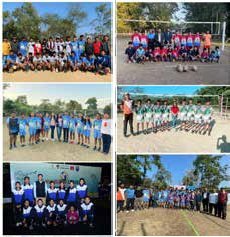
The corporate sector should come up with a concrete action plan to ensure that the benefits of economic reforms and industrial growth are available to the people living in poverty.
Public-private partnerships for rural development are receiving increased attention in the international community. The idea of linking for-profit business with the broad concerns of governments for economic and social development and achievement of the Millennium Development Goals (MDGs) is becoming increasingly manifested in a growing family of efforts within and outside the UN system.
CSR initiatives can support revitalizing these traditions by providing market linkages, skill training, and access to finance. This preserves cultural heritage and creates sustainable livelihoods, contributing to the economic upliftment of rural artisans and craftsmen.
The Ministry of Rural Development has regularly leveraged the funds under CSR for convergence-based schemes such as Saansad Adarsh Gram Yojana (SAGY) and Shyama Prasad Mukherji Rurban Mission (SPMRM) for converging private/corporate investments with the government initiatives for the development of Gram Panchayats/clusters identified under these schemes.
The details of expenditure incurred in the clusters of Shyama Prasad Mukherji Rurban Mission (SPMRM). According to the World Bank, CSR can be broadly defined as “the commitment of business to contribute to sustainable economic development by working with employees, their families, the local community and society at large to improve their quality of life, in ways that are both good for business and good for development.” At the heart of CSR is that companies can and should integrate sustainable economic development concerns into business operations and their interactions with stakeholders.
It is important to note that the CSR budget spend does not necessarily reflect the effectiveness or impact of a company’s CSR initiatives. There are also concerns about companies fulfilling the mandatory spending by making token donations or CSR activities that lack strategic planning and impact assessment.
Additionally, there is a need for greater transparency and accountability when implementing CSR initiatives in India. CSR and partnership approaches for rural development must be seen in the complex context of the governance challenge. CSR and partnership efforts must be rooted in a sound and maturing regulatory environment. Internationally, assistance is needed to build the regulatory capacity of state/central governments while continuing to explore how and when to combine voluntary incentives with regulatory approaches to CSR.
The states also, in turn, can encourage corporate and other stakeholders who are helping to improve the rural infrastructure by instituting awards and citations or even tax benefits. For example, the Tamil Nadu Government (2023) recognized the contribution of the private sector and corporations in developing villages, and the Corporate Social Responsibility (CSR) Award was constituted last year. The award was conferred to the best-performing Corporates till 2010.

The Corporate Social Responsibility Award has been reinstituted to recognize the outstanding work under CSR social responsibility by Industrial houses and the Private sector in the area of community and Village development in rural areas. Every year, one bestperforming Institution per district will be selected for the award with a cash prize of Rs.1 lakh and a citation.
ONGC, a leading Maharatna of the Nation, has regularly achieved 100% utilization of the CSR budget each year with maximum utilization enhancing rural infrastructure. The CSR initiatives of PowerGrid Corporation of India Ltd (PGCIL) in the Rural Sector have led to uplifting the rural & tribal folks across the county without intervening in their social fabric.
Several rural interventions have been done in many villages, touching the domains of integrated watershed management/rainwater harvesting, safe drinking water, sanitation and toilets for schools, improvement of agriculture productivity and livelihoods of small and marginal farmers, rural school renovations, and community development.
Rural development is considered to be of noticeable importance for the development of the Nation. Development in the rural sector will result in higher socio-economic equality and stability.
PGCIL, under the thematic area of Rural Development, is focused mainly on developing rural infrastructure. It includes Livelihood enhancement through Integrated Watershed Management, Construction of Community Health Centres, Construction of Schools, Class Rooms & Toilets Repair, Construction of Roads, Bridges and Culverts Construction of Panchayat Bhawan, Community hall, Marriage hall, Chhath Ghat and Crematorium complex Installation of Solar street lights, Submersible Pumps, Hand pumps.
For around two decades, OIL has involved local youth clubs and school children to promote games and sports with a focus on athletics by organizing Rural Sports events in villages in its operational areas in Assam, in collaboration with social groups, district administration and sports bodies. These OIL-sponsored rural sports events have produced young athletes now participating at district, state, and national levels. The Oilindians support aspiring volleyball players in rural villages of Assam.
Rural dwellers do not have the same access as urban dwellers regarding education, technology, skills, health, and hygiene. Sonalika CSR, through various initiatives, is continuously working to provide them with awareness, education and skills to contribute to the country’s rural development. The company has also been running state-wide projects addressing infrastructural concerns, like Dam in Datoda, Madhya Pradesh.



















